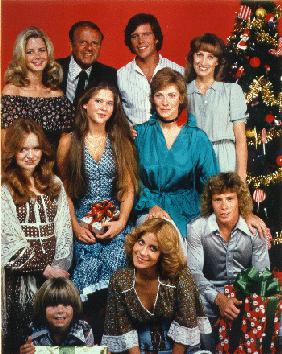Does the media we watch, or even the books we read, contribute to forming our attitudes, or is it mostly passing entertainment that makes no meaningful mark? This basic question comes up in different contexts, and can lead to endless speculation, but I just realized I have an oddball story about American TV.
I used to watch Eight is Enough, a largely forgotten piece of pop cultural ephemera starring Dick Van Patten as the father of eight kids, which ran from 1977-1981, although I'd guess I only watched the first few seasons. Star Wars fans may remember it as the show on which Mark Hamill originally played the oldest son. I also read the memoir it was based on, because I've always been like this, so I knew that in real life, the parents were a D.C. power couple and the kids were friends with the younger Kennedys. None of that was on the show.

I have largely forgotten the details, except, you know, the kids were always getting into problems. However, this morning there was a passing mention on the news of a school ROTC program, and it occurred to me that I have never heard mention of ROTC without thinking of a specific episode of Eight is Enough. The political daughter, Mary, is protesting the reopening of an ROTC program after the end of the Vietnam War (a return to normalcy, if you will), and she bumps into someone she knows, who's now in the military. Their parents are old friends, and because he's played by good-looking young Dorian Harewood (before his big break-out role in Roots: The Next Generations), sparks start to fly.
When they begin dating, she finds out that her dad -- a big post-hippie liberal -- is uncomfortable with her dating a black man. I'm sure that if I re-watched this episode, it would be cringey, a subpar TV dramedy version of Guess Who's Coming to Dinner? But what I remember is Mary calling her dad on his liberal bullshit. He believed he was all for equality, but not really. He was literally the guy with black friends, who thought he didn't have any prejudices, but he obviously does, just hidden. Not only the hypocrisy of this common situation, but the absurdity of it, was very obvious to me, and I've always remembered it.
I'm sure I always had a certain frame of mind that made me receptive to seeing things in a certain light, but still. This episode aired in November 1977, and the mere fact that it addressed the issue of liberal racism introduced me to the fact that this was a thing to deal with. Sometimes just acknowledging that something exists can be helpful for people to whom concepts are new!
For a deeper look at this subject, I recommend the Martin Luther King, Jr. collection Where Do We Go From Here: Chaos or Community? Way more than I can Eight is Enough, but to each their own.
I used to watch Eight is Enough, a largely forgotten piece of pop cultural ephemera starring Dick Van Patten as the father of eight kids, which ran from 1977-1981, although I'd guess I only watched the first few seasons. Star Wars fans may remember it as the show on which Mark Hamill originally played the oldest son. I also read the memoir it was based on, because I've always been like this, so I knew that in real life, the parents were a D.C. power couple and the kids were friends with the younger Kennedys. None of that was on the show.

I have largely forgotten the details, except, you know, the kids were always getting into problems. However, this morning there was a passing mention on the news of a school ROTC program, and it occurred to me that I have never heard mention of ROTC without thinking of a specific episode of Eight is Enough. The political daughter, Mary, is protesting the reopening of an ROTC program after the end of the Vietnam War (a return to normalcy, if you will), and she bumps into someone she knows, who's now in the military. Their parents are old friends, and because he's played by good-looking young Dorian Harewood (before his big break-out role in Roots: The Next Generations), sparks start to fly.
When they begin dating, she finds out that her dad -- a big post-hippie liberal -- is uncomfortable with her dating a black man. I'm sure that if I re-watched this episode, it would be cringey, a subpar TV dramedy version of Guess Who's Coming to Dinner? But what I remember is Mary calling her dad on his liberal bullshit. He believed he was all for equality, but not really. He was literally the guy with black friends, who thought he didn't have any prejudices, but he obviously does, just hidden. Not only the hypocrisy of this common situation, but the absurdity of it, was very obvious to me, and I've always remembered it.
I'm sure I always had a certain frame of mind that made me receptive to seeing things in a certain light, but still. This episode aired in November 1977, and the mere fact that it addressed the issue of liberal racism introduced me to the fact that this was a thing to deal with. Sometimes just acknowledging that something exists can be helpful for people to whom concepts are new!
For a deeper look at this subject, I recommend the Martin Luther King, Jr. collection Where Do We Go From Here: Chaos or Community? Way more than I can Eight is Enough, but to each their own.

No comments:
Post a Comment